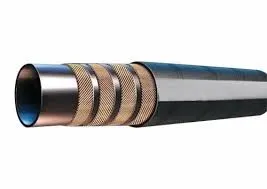Oct . 09, 2024 16:31 Back to list
flexible hydraulic hose definition
Understanding Flexible Hydraulic Hoses Definition, Applications, and Importance
Hydraulic systems play a crucial role in numerous industries, including construction, automotive, agriculture, and manufacturing. At the heart of these systems lie components that ensure efficiency and effectiveness, among which the flexible hydraulic hose stands out. Understanding its definition, functionality, and applications can provide valuable insights into its significance in modern engineering and mechanics.
Definition of Flexible Hydraulic Hose
A flexible hydraulic hose is a type of conduit designed to transport hydraulic fluid under pressure within hydraulic systems. Unlike rigid pipes, flexible hoses are constructed from materials that allow them to bend and flex, accommodating movement while maintaining high performance. Typically, these hoses are made from a combination of synthetic rubber, reinforced with textile or steel wire, which imparts strength and flexibility.
The primary function of a hydraulic hose is to transfer hydraulic fluid between various components of a hydraulic system, such as pumps, actuators, and valves. The hose must withstand substantial pressure, often exceeding several thousand pounds per square inch (psi), depending on the application. As a result, they come in various sizes and pressure ratings to meet specific operational requirements.
Construction and Characteristics
The construction of flexible hydraulic hoses typically involves multiple layers. The inner layer, known as the tube, is designed to handle the hydraulic fluid and is usually made from a high-quality synthetic rubber that resists degradation from oils and heat. The reinforcing layer, which may consist of textile fibers or steel wire, provides strength and prevents the hose from bursting under high pressure. The outer layer, often referred to as the cover, protects the hose from physical damage, abrasion, and environmental factors.
One of the key characteristics of flexible hydraulic hoses is their ability to bend and flex without compromising performance. This flexibility allows for easier routing in complex machinery or constrained spaces, making them essential in applications where rigid piping would be impractical.
flexible hydraulic hose definition

Applications of Flexible Hydraulic Hoses
Flexible hydraulic hoses are ubiquitous across various industries due to their versatility. In the construction industry, they are commonly used in hydraulic excavators and cranes, where they connect hydraulic pumps to hydraulic cylinders, enabling smooth and powerful movements. In the automotive sector, hydraulic hoses are critical in systems such as braking, power steering, and lifting mechanisms.
The agriculture industry also relies heavily on flexible hydraulic hoses, especially in machinery like tractors and combine harvesters, which utilize hydraulic power to operate attachments and implements effectively. Additionally, manufacturing and industrial processes benefit from hydraulic hoses in equipment such as presses and conveyors that require precise fluid control.
Importance of Flexible Hydraulic Hoses
The importance of flexible hydraulic hoses extends beyond mere functionality. They contribute significantly to the safety and reliability of hydraulic systems. High-quality hoses ensure that fluids are contained under pressure, minimizing the risk of leaks that could cause equipment failure or hazardous working conditions. Regular maintenance and inspection of hydraulic hoses are essential to prevent wear and tear, which can lead to catastrophic failures.
Moreover, advancements in hose technology have led to the development of hydraulic hoses that can withstand extreme conditions, such as high temperatures and corrosive environments. This innovation not only enhances the lifespan of the hoses but also improves the overall efficiency of hydraulic systems.
Conclusion
In summary, flexible hydraulic hoses are an integral component of hydraulic systems across various industries. Their unique construction and characteristics enable them to transfer hydraulic fluid efficiently while accommodating movement and flexibility. Understanding their definition, applications, and importance highlights the vital role they play in ensuring the safe and effective operation of hydraulic machinery. As industries continue to evolve, the demand for reliable and high-performance hydraulic hoses will undoubtedly increase, further underscoring their significance in modern engineering and mechanics.
-
Best Four Steel Wire Spiral Hose Hydraulic R12 – Durable High-Pressure Hose Manufacturer
NewsJul.08,2025
-
High-Quality 1/4 Hydraulic Hose – Soft, Flexible & Durable Rubber Hoses for Industrial Use
NewsJul.08,2025
-
1 1 2 Inch Hydraulic Flexible Hose - Durable, Reliable, High-Pressure Solutions
NewsJul.07,2025
-
High-Quality 1 2 Rubber Hose - Durable, Flexible Hydraulic Solutions
NewsJul.07,2025
-
Discover SAE Hydraulic Hose Types - High Quality & Durable Hoses from Leading Factory Supplier
NewsJul.06,2025
-
High Pressure Wire Hydraulic Rubber Hose Supplier Durable & Reliable 1SN Hose Solutions
NewsJul.06,2025
